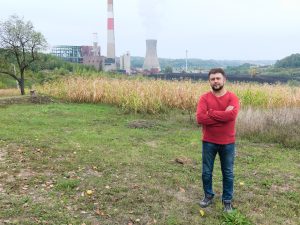Mile Krstic is expecting a new neighbor. Just a few hundred meters from his house in the Republika Srpska entity of Bosnia and Herzegovina, the ground has been prepared for the new coal-fired power station Ugljevik III, which is being built by Chinese and Polish-Chinese firms.
Krstic’s house is already surrounded by the city’s substantial coal industry: Ugljevik I, one of Europe’s most polluting coal-fired power stations, is directly in front of it, and his backyard looks onto the huge Bogutovo Selo open pit coal mine.
The burning of coal has seriously affected the health of residents in the village. Mile Krstic recently lost both his wife and father to cancer, and blames the coal industry for their deaths. The power plant and mine release clouds of ash and smoke over the village every day.
Ugljevik is not the only European town in which new power plants are planned, despite international commitments to stop climate change and Chinese President Xi Jinping’s recent pledge to stop financing coal power abroad. In Bosnia and Herzegovina alone, China’s Eximbank is financing the Tuzla 7 coal-fired power project, whose construction is imminent despite investigations by EU’s energy watchdog for breaches of EU law.
Our research further shows that there is a major risk of Chinese-financed power plants being built in Indonesia, the Philippines, and Serbia. All these projects were announced by Chinese state-owned enterprises in 2021, and have a total estimated capacity of over 3,645 MW. Chinese-backed overseas coal projects with an additional 10 GW of capacity are already in the pipeline and are likely to begin construction any moment.
Every new power plant has an expected lifespan of 40–50 years. If put into operation, these plants will challenge international climate agreements such as the G-20 pledge and China-U.S. joint declaration at COP26.
The construction of many Chinese-funded overseas coal projects has commenced without the necessary legal environmental assessments and permits required by the host country. Others have been delayed because of environmental or social impact scandals, or legal challenges.
This is also the case with Ugljevik III. In June 2021, it was revealed that a secret contract was signed for the plant between Chinese company China Electric and Polish-Chinese enterprise Sunningwell International LTD. Prior to this, it was not publicly known that either company was participating in the project.
The project’s concession has been held since 2013 by Comsar Energy and RiTE Ugljevik, the latter of which is apparently owned by Dagestan billionaire Rashid Serdarov. In 2020, the Concession Commission of Bosnian entity Republika Srpska stated that the concessionaire was not fulfilling its obligations but failed to recommend action to tackle the issue.
This secret contract prompted environmental organizations to express concerns and call on the Republika Srpska government to “publicly and transparently declare the plans and consequences of this power project.”
An analysis from Just Finance shows that the feasibility studies and environmental impact assessments for Ugljevik III and Tuzla 7 contain serious errors and false assumptions that undermine legal requirements, transparency, and the procedures for acquiring environmental permits.
The lack of reliable feasibility studies not only undermines accountability but will most likely have hazardous consequences on public finance, the environment, local communities, and the climate.
Altogether, Just Finance found 11 major errors or false assumptions in the pre-studies for the Tuzla 7 and Ugljevik III coal power plants. These included underestimated prices for coal and CO2 emissions, unclear ash disposal locations, and a failure to assess whether the water demands for cooling the plant could be met. Further, the studies did not assess the aggregate emissions from current and new units.
The construction of a new coal power plant might also be an unpleasant surprise for neighboring countries. The Espoo Convention, which governs transboundary environmental impacts, expressed “a profound suspicion of non-compliance by Bosnia and Herzegovina” for not having undertaken transboundary consultations. Their investigation is ongoing.
For Mile Krstic and his neighbors next to the Ugljevik power plant, life has become a nightmare. The entire community has been affected by mining excavations over the last few years, and the whole village needs to move. Many houses are now leaning or falling apart, while their owners desperately try to stabilize them with new concrete and steel bars.
Krstic wants to move, but cannot sell his house. His future now rests with the company Comsar, which he hopes will give him enough compensation to buy an apartment for himself, his 8-year-old daughter, and his mother, somewhere in Ugljevik.
He said, “I would do anything to move my daughter to a safe place.”

































